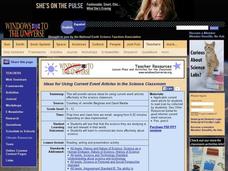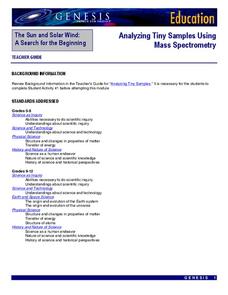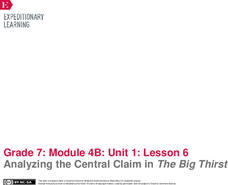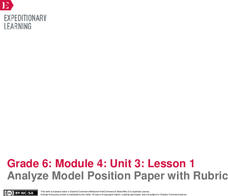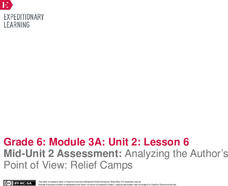Curated OER
Reading Fiction: Analyzing Sentences
Students investigate sentence construction in fiction. In this sentence construction lesson, students examine examples of fiction work and discover why sentences are a certain length. Students create their own passages playing with...
Curated OER
ANALYZING RUMORS AND MYTHS
Eleventh graders explore the phenomenon of "disinformation" that often circulates during a crisis. In this American Government lesson, 11th graders analyze an article on myths and rumors.
Curated OER
Who Is Family? Analyzing Family Photos
Students examine families through photography. In this interdisciplinary activity, students examine photographs of families and discuss the attributes of families. Students select family photographs to analyze in writing.
Polk Bros Foundation
Analyze History
Determining the central idea of a historical event or theme involves identifying key points of information, such as the people and place involved in the history, challenges faced, and choices made. Your young historians can use this...
Curated OER
Analyzing Sonnets
Model for your class how to craft an analysis of a sonnet by examining the literary techniques used, the background of the poet, and critical reviews of the poem. As guided practice, learners are assigned a sonnet, complete a preliminary...
Curated OER
Analyzing Word Use Through Guided Wordle
Even though this lesson is just a basic way to review verb usage, it takes a novel approach. First, pupils identify verbs that they use too often in their writing, and then they create a Wordle. Wordle is a website that provides graphic...
Curated OER
One Step at a Time
Young scholars investigate the customs and habits of other cultures by reading letters from a Peace Corps Volunteer. In this global customs lesson plan, students discuss how analyzing a culture is similar to analyzing art, no two people...
Curated OER
Ideas for Using Current Event Articles in the Science Classroom
It is important that future responsible scientists and citizens are able to read and analyze scientific literature. Here you will find four ideas for bringing current science event articles into your classroom. Suggestions range from...
Curated OER
Guest Readers
Young readers explore reading comprehension by creating a class presentation. In this storytelling instructional activity, puils read an assigned text in class and analyze the characters, settings and story. They create an illustrated...
Curated OER
Energy Worksheet #1
A graph of Earth's average monthly temperatures from 1990 to 1994 is posted across the top of the page for meteorology masters to analyze. Five multiple choice questions are asked regarding temperature variation. This does not have to be...
Curated OER
Poetry Assignment Instead of a Test
"The Last Song" by Bernie Taupin and Elton John is the inspiration for an analysis assignment. Individuals read the song and answer nine questions about the speaker, figurative language, and significance of the lyrics. Use this as an...
EngageNY
Analyzing Main Ideas and Details: Why Care about Water?
Pay attention to details! After completing text-dependent questions about paragraphs 10-12 of "Water is Life," scholars view the video "Why Care about Water. "They view the video three times and use a Main Idea and Details note-catcher...
Curated OER
Analyzing the Use of Irony in a Short Story
Ninth graders examine how literature connects to real-life and see how irony aids in the development of theme. They read Shirley Jackson's The Lottery, and discuss elements of foreshadowing and situational irony. Then learners will write...
EngageNY
Analyzing a Verbal Description
What function will describe the insect population growth? Pairs or small groups work together to determine which type of function and specific function will model given scenarios. The scenarios differentiate between linear, exponential...
NASA
Analyzing Tiny Samples Using a Search for the Beginning Mass Spectrometry
Teach the basics of mass spectrometry with a hands-on lesson. The fourth in a series of six lessons explores how mass spectrometry measures the ionic composition of an element. Learners then compare and contrast relative abundance and...
EngageNY
Analyzing the Central Claim in The Big Thirst
Quench the class's thirst for knowledge while building analytical skills. Scholars listen as the teacher reads excerpt from the book The Big Thirst. They then complete a close read and answer text-dependent questions from pages one...
EngageNY
Analyze Model Position Paper with Rubric
It's time to choose a position! Scholars read a model position paper about fracking to practice identifying the topic and argument. Then, working with a partner, they use a rubric to assess the essay.
EngageNY
Analyzing Point of View: Inferring about the Natural Disaster in Eight Days
Who is telling the story? Readers take a look at the text Eight Days to determine if the story is told in first or third person. They then discuss in groups and complete a shared writing activity to describe how the narrator's point of...
EngageNY
Analyzing Point of View: Inferring about the Impact of Hurricane Katrina on People Living in New Orlean
What, where, how? Readers hone their analysis skills as they determine the narrator's point of view in Eight Days. They complete a literary analysis chart and essay to describe what and where events take place. Individuals then discuss...
EngageNY
Analyzing Residuals (Part 1)
Just how far off is the least squares line? Using a graphing calculator, individuals or pairs create residual plots in order to determine how well a best fit line models data. Three examples walk through the calculator procedure of...
EngageNY
Analyzing a Graph
Collaborative groups utilize their knowledge of parent functions and transformations to determine the equations associated with graphs. The graph is then related to the scenario it represents.
EngageNY
Analyzing a Data Set
Through discussions and journaling, classmates determine methods to associate types of functions with data presented in a table. Small groups then work with examples and exercises to refine their methods and find functions that work to...
NASA
MASS, MASS – Who Has the MASS? Analyzing Tiny Samples
What is it worth to you? A hands-on instructional activity asks groups to collect weights of different combinations of coins and calculate weighted averages. They use the analysis to understand the concept of an isotope to finish the...
EngageNY
Mid-Unit 2 Assessment: Analyzing the Author’s Point of View: Relief Camps
We're halfway there ... what a relief! Scholars read an excerpt from a primary source about the relief camps associated with the1906 San Francisco earthquake. Next, they complete a mid-unit assessment, answering short-answer and...
Other popular searches
- Analyze Portraits
- Analyze Characterization
- Analyze Maps and Charts
- Analyze Setting
- Analyze Writing Technique
- Analyze Character
- Analyze Poetry
- Analyze Letter to Editor
- Analyze Information
- Analyze Facts
- Analyze Author's Use of Text
- Analyze Plot Development









